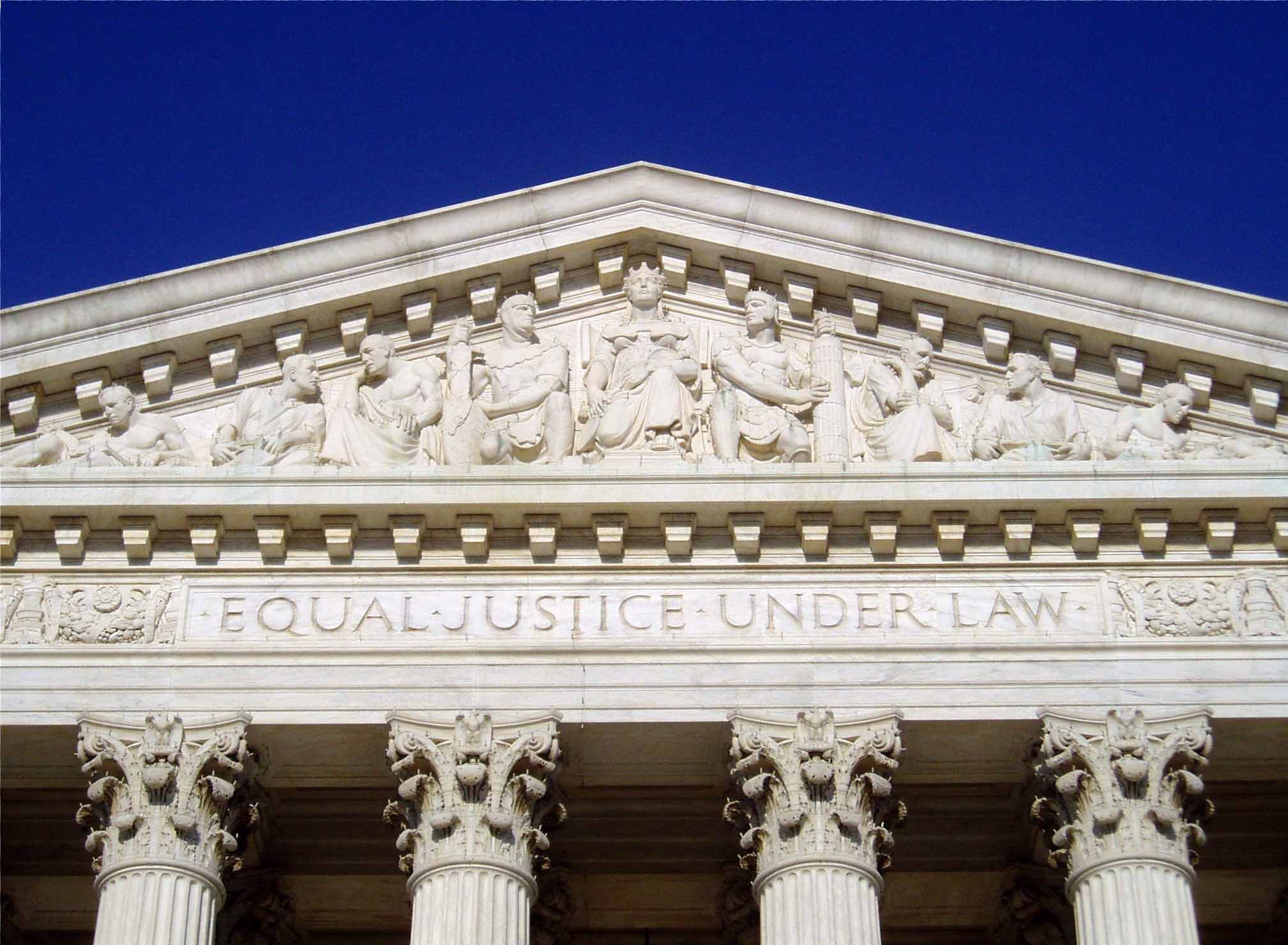I.
Der frühere US-Präsident Trump hatte am 12. Februar dem US Supreme Court zwei Fragen vorgelegt:
„I. Whether the doctrine of absolute presidential immunity includes immunity from criminal prosecution for a President’s official acts, i.e., those performed within the ‚›outer perimeter‹ of his official responsibility.‘ Nixon v. Fitzgerald, 457 U.S. 731, 756 (1982) (quoting Barr v. Matteo, 360 U.S. 564, 575 (1959)).
II. Whether the Impeachment Judgment Clause, U.S. CONST. art. I, § 3, cl. 71, and principles of double jeopardy foreclose2 the criminal prosecution of a President who has been impeached and acquitted by the U.S. Senate for the same and/or closely related conduct that underlies the criminal charges.“
(S. 13 der digitalen bzw. S. 1 der gedruckten [unten in der Mitte] Seitenzählung; Fußnoten + Hyperlink im Zitat hinzugefügt)
Zuvor hatten das Bundesrechtsmittelgericht für den District of Columbia (d.h.: Washington) und das Bundesbezirksgericht für den District of Columbia, bei dem das Strafverfahren wegen Trumps Versuch, das Wahlergebnis 2020 zu kippen, in Hauptsache anhängig ist, gegen Trump entschieden.
Das Bezirksgericht3 (District Court) – Einzelrichterin – hatte am 1. Dezember entschieden:
„For the foregoing reasons, the court will DENY Defendant’s Motion to Dismiss Indictment Based on Presidential Immunity, ECF No. 74 [52 Seiten], and Motion to Dismiss the Indictment Based on Constitutional GroundsECF No. 113, [31 Seiten].“
(https://storage.courtlistener.com/recap/gov.uscourts.dcd.258148/gov.uscourts.dcd.258148.171.0_3.pdf, S. 48; Hyperlinks + Seitenumfang hinzugefügt)
Dagegen rief Trump das Rechtsmittelgericht (Court of Appeals)4 – Spruchkörper mit drei RichterInnen – an, das die Entscheidung des Bezirksgerichts am 6. Februar einstimmig bestätigte („The panel consisted of two judges appointed by President Joe Biden, Florence Pan and Michelle Childs, and one appointed by President George H.W. Bush, Karen Henderson.“):
„We have balanced former President Trump’s asserted interests in executive immunity against the vital public interests that favor allowing this prosecution to proceed. We conclude that ‚[c]oncerns of public policy, especially as illuminated by our history and the structure of our government‘ compel the rejection of his claim of immunity in this case. See Fitzgerald, 457 U.S. at 747–48. We also have considered his contention that he is entitled to categorical immunity from criminal liability for any assertedly ‚official‘ action that he took as President — a contention that is unsupported by precedent, history or the text and structure of the Constitution. Finally, we are unpersuaded by his argument that this prosecution is barred by ‚double jeopardy principles.‘ Accordingly, the order of the district court is AFFIRMED.“
(https://storage.courtlistener.com/recap/gov.uscourts.cadc.40415/gov.uscourts.cadc.40415.1208593677.0_3.pdf, S. 57)
Das Rechtsmittelgericht gewährte Trump eine Frist bis 12. Februar, um beim US Supreme Court einen „stay of the mandate [, das Strafverfahren vor dem Bezirksgericht fortzusetzen,] pending the filing of a petition for a writ of certiorari“, zu beantragen. Der stay setzt die Entscheidung des unteren Gerichts vorläufig außer Vollzug; die „petition for a writ of certiorari“ ist der eigentliche Antrag, die Entscheidung des unteren Gerichts durch das höhere zu überprüfen.
Der Supreme Court hatte drei Möglichkeiten, zu entscheiden:
- Möglichkeit 1: Den beantragten stay (schnell) abzulehnen – und das Strafverfahren wäre weitergegangen.
- Möglichkeit 2: Dem stay stattzugeben, und Trump hätte dann viel Zeit gehabt, seine petition einzureichen – und Strafverfahren hätte währenddessen auf Eis gelegen.
- Möglichkeit 3: Den Antrag für den stay gleich in die petition umzudeuten, dieser stattzugeben und das Verfahren beschleunigt durchzuführen.
Die Vereinigten Staaten (also: die Anklagebehörde) beantragten, 1 hilfsweise 3:
„The application for a stay of the mandate should be denied. Alternatively, the Court should treat the application as a petition for a writ of certiorari, grant the petition, and order expedited briefing and argument.“ (S. 39 f. der digitalen und S. 39 f. der gedruckten [oben in der Mitte] Seitenzählung)
Trump wollte kein beschleunigtes Verfahren, sondern sogar, daß das Verfahren zunächst noch einmal an das Rechtsmittelgericht zurückgereicht wird, damit dieses in voller Besetzung neu entscheidet:
„This Court should stay the D.C. Circuit’s mandate pending the filing and disposition of an en banc petition in the D.C. Circuit and, if necessary, a petition for certiorari in this case.“ (S. 16 bzw. 15)5
Der Supreme Court entschied sich Mittwoch am späten Abend MEZ für Möglichkeit 3:
„The application for a stay presented to The Chief Justice is referred by him to the Court. The Special Counsel’s request to treat the stay application as a petition for a writ of certiorari is granted, and that petition is granted limited to the following question: Whether and if so to what extent does a former President enjoy presidential immunity from criminal prosecution for conduct alleged to involve official acts during his tenure in office. Without expressing a view on the merits, this Court directs the Court of Appeals to continue withholding issuance of the mandate until the sending down of the judgment of this Court. The application for a stay is dismissed as moot.“
Zugleich verfügte der Supreme Court folgenden Zeitplan:
„The case will be set for oral argument during the week of April 22, 2024. Petitioner’s brief on the merits, and any amicus curiae briefs in support or in support of neither party, are to be filed on or before Tuesday, March 19, 2024. Respondent’s brief on the merits, and any amicus curiae briefs in support, are to be filed on or before Monday, April 8, 2024. The reply brief, if any, is to be filed on or before 5 p.m., Monday, April 15, 2024.“ (Hv. hinzugefügt)
Da kein Abstimmungsergebnis und keine abweichenden Voten veröffentlicht wurden, kann vermutet werden, daß das Gericht einstimmig entschied (oder es jedenfalls keineR der RichterIn für nötig hielt, Widerspruch öffentlich zu bekunden).
Der Rechtsexperte der Los Angeles Times, Harry Litmann, schreibt bei dem Kurznachrichtendienst, der unter der Adresse twitter.com erreichbar ist, zu dem Zeitplan:
„Fairly expedited schedule but I’ve seen faster.“
Falls der Supreme Court am Ende gegen Trump entscheidet – und dies relativ schnell –, könnte das Verfahren vor den Geschworenen des Bezirksgerichts im August oder September beginnen, so der Senior legal affairs reporter von politico.com, Kyle Cheney:
„*If* the court rules relatively quickly, and *if* it rules against Trump, it could tee up his trial for August or September. But the trial is unlikely to come much earlier than that, given Chutkan’s promise to ensure he has another few months of prep.“
(https://twitter.com/kyledcheney/status/1762962505704321355; vgl. https://twitter.com/harrylitman/status/1762963907453317520)
II.
- Antrag von Trump an den Supreme Court (51 Seiten + 58 Seiten Anlagen)
- Erwiderung der Vereinigten Staaten (d.h.: der Anlagebehörde) (40 Seiten)
- Rückantwort von Trump (17 Seiten)
- Außerdem gab es acht sog. Briefs amicus curiae (Stellungnahmen von ‚Freunden des Gerichts‘, also von fachlich oder ngo-mäßig interessierten Kreise)
III.
Auch in dem in Florida anhängigen Fall wegen der Geheimdokumente, die nach dem Ende von Trumps Amtszeit in seinem dortigen Wohnsitz gefunden wurde, beansprucht Trump Immunität.
Die Rechtskorrespondentin von MSNBS, Lisa Rubin, schreibt dazu bei twitter.com:
„I thought SCOTUS would deny Trump a stay in the federal election interference case, not convert that motion into a petition for review and grant it. But as I wrote last week, Trump’s motion to dismiss the Mar-a-Lago indictment on immunity grounds could have been a decisive…”
(https://twitter.com/lawofruby/status/1763002991563407414)
IV.
Berichte zur Entscheidung des US Supreme Courts:
- Supreme court to hear Trump immunity claim in election interference case
https://www.theguardian.com/us-news/2024/feb/28/supreme-court-donald-trump-immunity-claim (dort ist erklärt, wie sich die Prognose erklärt, das Verfahren vor den Geschworenen könne frühstens im Spätsommer beginnen: Supreme Court-Entscheidung vielleicht im Mai + 87 Tage verbleibende „defense preparation time“) - Supreme Court stalls Trump’s federal election trial while weighing his immunity bid
https://www.politico.com/news/2024/02/28/supreme-court-trump-immunity-00143985 - In Taking Up Trump’s Immunity Claim, Supreme Court Bolstered His Delay Strategy
https://www.nytimes.com/2024/02/28/us/politics/trumps-immunity-supreme-court-delay-strategy.html - Column: Without even ruling on Trump’s immunity claim, the Supreme Court handed him a huge victory
https://www.latimes.com/opinion/story/2024-02-28/supreme-court-immunity-donald-trump-jan-6-harry-litman - How the Supreme Court just threw Trump’s 2024 trial schedule into turmoil
https://www.politico.com/news/2024/02/28/how-the-supreme-court-just-threw-trumps-2024-trial-schedule-into-turmoil-00144043
1 „Judgment in Cases of Impeachment shall not extend further than to removal from Office, and disqualification to hold and enjoy any Office of honor, Trust or Profit under the United States: but the Party convicted shall nevertheless be liable and subject to Indictment, Trial, Judgment and Punishment, according to Law.“ (https://www.govinfo.gov/content/pkg/CDOC-110hdoc50/pdf/CDOC-110hdoc50.pdf, S. 9 der digitalen und S. 3 der gedruckten [oben rechts] Seitenzählung)
2 „No person shall be held to answer for a capital, or otherwise infamous crime, unless on a presentment or indictment of a Grand Jury, except in cases arising in the land or naval forces, or in the“ (ebd., S. 13 f. bzw. 19 f.)
3 Die Schriftsätze der Beteiligten und Entscheidungen des Gerichts in diesem Verfahren gibt es dort: https://www.courtlistener.com/docket/67656595/united-states-v-trump/?page=1.
4 Die Schriftsätze der Beteiligten und Entscheidungen des Gerichts in diesem Verfahren gibt es dort: https://www.courtlistener.com/docket/68073028/united-states-v-donald-trump/.
5 Da davon ausgehen ist, das Trump vor dem Supreme Court – mit drei (von insgesamt neun) von Trump selbst ernannten RichterInnen – bessere Chancen hat als vor dem Court of Appeals, scheint Trump jedenfalls kein Interesse daran zu haben, das Strafverfahren schnell vom Tisch zu bekommen, bzw. damit zu rechnen, am Ende nicht einmal vor dem Supreme Court erfolgreich zu sein, sondern vor allem auf Zeitgewinn zu spielen.



